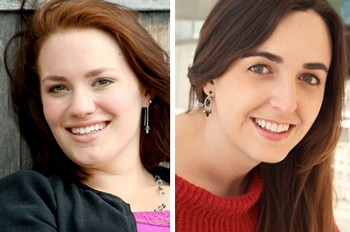by Mike Telin

Ralph Vaughan Williams’s Riders to the Sea is set in the Aran Islands, off Ireland’s west coast. Before the opera opens, Maurya has lost her husband, father-in-law, and four of her six sons at sea. Mezzo soprano Lyndsay Moy (left), who performs the role of Maurya, says all one needs to do to perceive the difficulties of daily life the opera’s characters are forced to endure is to look at the geographic location where the opera is set.
“It’s easy to understand just how dangerous the ocean can be. And Maurya is someone who has experienced a lot of pain caused by the ocean. She has lost her husband, her father-in-law and four sons and at the beginning of the opera she presumes that her fifth son, Michael, is also dead. You can understand why she is so fearful to lose her sixth son, Bartley. I think she is worn from worry and years of loss, but she does understand that this is the reality of living on the island: men risk their lives in order to work.”
Maurya’s submitting to her own fate is something Moy finds interesting about the opera. “She knows that someday Bartley will die at the hands of the sea. She doesn’t know when, but she does have a feeling that his death is imminent. But her fear is rational and is seeded in the truth of her own life. Once she received confirmation that Michael has indeed been killed and now Bartley is gone, everything comes floating out of her. But in the end she arrives at a place of inner calmness. She even says ‘They are all gone now, and there isn’t anything more the sea can do to me.’ An acceptance of her fate.”
Musically the role requires Moy to sing very long phrases. “Maurya speaks so slowly and with such power. Because of that many of the vocal lines are drawn out,s and maintaining the line to the end of a phrase was difficult at first.”
Vaughan-Williams based his opera on the one-act play of the same name by the Irish playwright John Millington Synge. “We read through the opera as if it were the play a few times with Irish accents — or as much as we could muster, Moy said. “It’s a story that you can understand the first time you read it but the more you [live with it] it becomes even more powerful.”
Henry Purcell’s Dido & Aeneas tells the story of two lovers faced with conflicting destinies. The heroic Aeneas falls madly in love with Dido, the Queen of Carthage, but cannot escape the divine command to cross the Mediterranean Sea and lay the foundations of what will become the Roman Empire.
“In both operas the leading women are forced to confront their own fate”, says Elizabeth Frey (right), who performs the role of Dido. “In Riders, Mouyra is done wrong by the sea and her fate was inevitable. But with Dido there are people who are conspiring against her throughout the opera. The witches are responsible for her fate and yet, it would have happened anyway. Aeneas was destined to leave. Fate is working against both of these women.”
Frey says she’s having a wonderful time with the role. “The music is so beautiful. And of course, Dido’s lament at the end is probably the most famous of all baroque arias, because it is so heartbreaking as most of Dido’s music is. This first thing she sings is ‘I am pressed with torment.’ And the last thing she says is ‘I’m dying, remember me.’ So finding a way to stretch myself so that I am not lamenting the entire time is the challenge and I love that challenge.”
Why does Dido have to die? Frey thinks there are many ways of addressing that question. “The idea that because this man leaves her she dies — or basically kills herself because of a broken heart — is, in this day and age hard to swallow. In this production that is interpreted in a more contemporary way, but that will be a surprise.”
Frey says that she sees Dido as a woman with depth, and that’s a kind of role that is new to her. “I’m a mezzo and this is a new type of character for me to be playing. Previously, if I’ve been a good person, then I’ve been portraying a man. And if I’m portraying a woman then I have always been a villainess. Now I get to portray a vulnerable leading lady. And that’s where the challenges both in the acting and the singing come into play. You have to dig deep for this role.”
Published on ClevelandClassical.com February 24, 2014
Click here for a printable version of this article.



